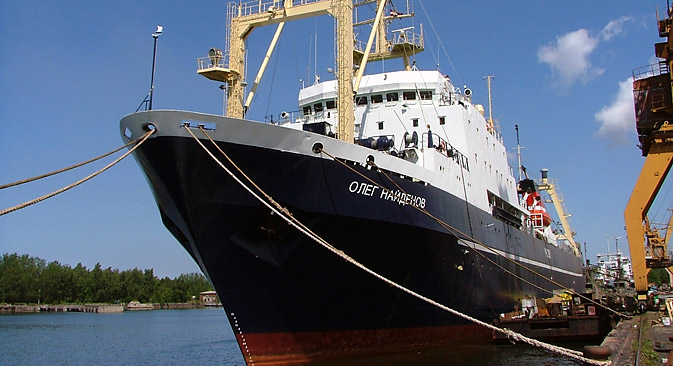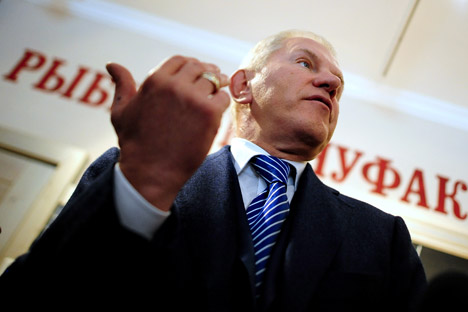Greenpeace may be drawn into fishing wars

The Senegalese military detained the Oleg Naydenov trawler 46 miles off the coast of Guinea-Bissau. Source: ITAR-TASS
The Russian Federal Fisheries Agency (Rosrybolovstvo) has suggested that the international environmental organization Greenpeace may have something to do with the row over the illegal seizure of a Russian fishing ship by the Senegalese military.
Experts believe that the controversy is an attempt to squeeze Russian fishing vessels out of African waters.
Rosrybolovstvo head Andrei Krayny said he has not ruled out that Greenpeace may have had something to do with the Senegalese authorities' move to seize the Oleg Naydenov trawler on January 4.
"According to information available to us, the Senegalese military were – shall we say – egged on by activists of the well-known organization Greenpeace," he said.
Rosrybolovstvo believes that talks with Senegalese President Macky Sall on releasing the Russian ship, which were set for January 7, failed to take place also under pressure from Greenpeace.

Andrei Krayny: "According to information available to us, the Senegalese military were – shall we say – egged on by activists of the well-known organization Greenpeace." Source: ITAR-TASS
Environmental activists have more than once accused Russia of illegal fishing off the African coast.
The Prime news agency quoted the Oleg Naydenov captain, Vadim Mantorov, as saying that at the moment it was seized, the ship was not fishing and was in the exclusive economic zone of Guinea-Bissau.
Rosrybolovstvo's monitoring system confirmed this. However, the Senegalese military detained the ship 46 miles off the coast of Guinea-Bissau, with which Senegal is engaged in a long-standing dispute over the boundaries of their exclusive economic zones, and escorted it to Dakar.
According to Rosrybolovstvo spokesman Aleksandr Savelyev, such aggressive actions on the part of Senegal are beyond explanation.
Related:
How special economic zones can boost Russia's business
A roadmap to success: discussing Russia's special economic zones
All the more so since its arrival in Dakar, the Oleg Naydenov trawler has already been subjected to two inspections — first on January 5, when it was visited by a fisheries commission and again on January 6, whena port authority commission checked the ship's safety and seaworthiness.
Had the ship been engaged in illegal fishing, it would have had illegal catch onboard. However, the inspectors did not find anything objectionable onboard the Russian ship.
The Russian trawler has remained guarded by the military in the port of Dakar for over a week now, yet so far its crew has not been presented with any official complaints.
Talks between Russian diplomats and Senegalese President Macky Sall to discuss the situation have been postponed again and again.
Interestingly, against the backdrop of the row over the Oleg Naydenov trawler, Senegalese fish processing companies have expressed an interest in entering the Customs Union market.
Experts say that the Senegalese authorities have not yet developed a clear position as regards the situation with the Russian fishing ship. Which means that in this conflict the government of Senegal may have become an object of manipulation on somebody's part.
The Russian president's special envoy for cooperation with African countries Mikhail Margelov told the VZGLYAD newspaper that the Russian sailors might be used as hostages in a tough competition for the aquatic resources of this part of the Atlantic.
He said Russia was being squeezed out of its traditional fishing areas. "Russia has always been interested in getting access to the wealth of aquatic resources of Africa's Atlantic coast and the Gulf of Guinea and has no intention of leaving this competitive but very interesting market," he said.
Deputy head of research at the Institute of Africa under the Russian Academy of Sciences Leonid Fituni said in an interview with the Rossiyskaya Gazeta newspaper that after the break-up of the Soviet Union there had emerged numerous contenders for the resources the USSR used to develop: "This refers to marine as well as many other resources. That is why every attempt is being made to keep Russia sidelined and to prevent the Russian fishing fleet from returning to the African shores. As to who or what is used for this purpose – be it the Senegalese authorities, Greenpeace or somebody else – is a secondary matter."
Observers point out that after the Russian authorities detained Greenpeace's Arctic Sunrise ship, the environmental organization may have got one more reason to step up its campaign against Russian fishing vessels off the African coast.
In the meantime, Alexander Savelyev said, some 10 more Russian fishing boats are currently operating in that part of West Africa.
Asked whether their crews should be wary of similar sanctions from the local military and whether Rosrybolovstvo was going to recall Russian trawlers from the region, Savelyev replied that there were no causes for that. "They are fishing on legal grounds and with all the relevant permissions in place," he said.
Based on materials from Rossiyskaya Gazeta and Vzglyad.
All rights reserved by Rossiyskaya Gazeta.
Subscribe
to our newsletter!
Get the week's best stories straight to your inbox
